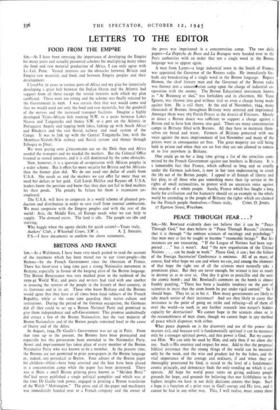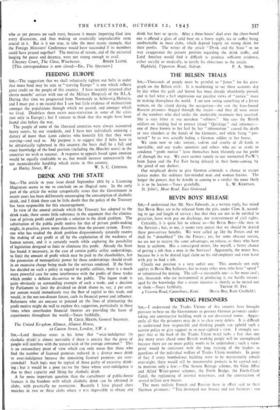PEACE THROUGH FEAR . . . ?
SIR,—Mr. Rowland evidently does not believe that it can be "Peace Through God," but does believe in " Peace Through Reason," claiming that it is through " the embryo sciences of sociology and psychology " that men may at last be taught to become "reasonable beings." But his instances are not reassuring. " If the League of Nations had been sup- ported . . ." but it wasn't. And " the new organisation of the United Nations . . . can be made to work." Please God, it can ; but the failure of the Foreign Secretaries' Conference is ominous. All of us must, of course, find what hope we can and where we can, and among the elements of that hope the right use of all the sciences must naturally take a prominent place. But they are never enough, for science is just as ready to destroy us as to save us. One day it gives us penicillin and the next the atomic bomb ; and Mr. Rowland's comment on the bomb is almost frankly puzzling, " There has been a laudable tendency on the part of scientists to insist that the atom bomb be put under rigid control." So I should hope. They let us in for it. How many governments are likely to take much notice of their insistence? And are they likely to carry that insistence to the point of going on strike and refusing—all of them all over the world—to work in any further research into nature's hidden capacity for destruction? We cannot hope in the sciences alone or in the reasonableness of man alone, though we cannot hope in any method of peace which dispenses with either.
What peace depends on is the discovery and use of the power that masters evil, and because evil is fundamentally spiritual it can be mastered only by a stronger spiritual power, and that power is God. But we cannot use Him. We can only be used by Him, and only then if we allow that use. Such is His courtesy and respect for man. Add to that the perpetual biblical insistence that the strong things of the world can be mastered only by the weak, and the wise and prudent led by the babes, and the vital importance of the average and ordinary, if and when they are thoroughly penetrated by God, is raised to the level of a fundamental cosmic principle, and democracy finds the only standing on which it can operate. All hope for world peace turns on giving ordinary people grounds for hope, and grounds for believing that our faithfulness to the highest insights we have in our daily decisions creates that hope. Such a hope is a function of a prior trust in God's energy and His love, and it cannot be had in any other way. This, I well realise, must annoy those who as yet possess no such trust, because it means importing God into every discussion, and thus making an essentially unpredictable term crucial to it. But is it not true, to take the most recent example, that the Foreign Ministers' Conference would have succeeded if its members could have prayed together? The motives of reason, and of the universal longing for peace and decency, were not strong enough to avail.



























 Previous page
Previous page